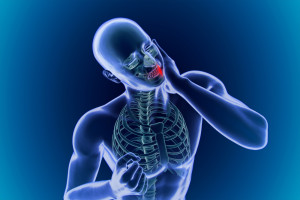 Many patients who’ve suffered from chronic headaches, earaches, jaw pain, and other craniofacial discomfort are often surprised to learn that the origin of their troubles lies with a dental problem; specifically, with the joints (temporomandibular joints) and muscles that move your jaw. TMJ disorder describes a condition where undue stress and pressure (usually from an uneven bite) damage your TMJs, causing inflammation and misalignment that disturbs an important nerve in your jaw. To help you understand how TMJ pain can lead to a host of seemingly non-dental symptoms, your Astoria dentist, Dr. Leibowitz, examines what you should know about the trigeminal nerve that innervates your jaw and much more.
Many patients who’ve suffered from chronic headaches, earaches, jaw pain, and other craniofacial discomfort are often surprised to learn that the origin of their troubles lies with a dental problem; specifically, with the joints (temporomandibular joints) and muscles that move your jaw. TMJ disorder describes a condition where undue stress and pressure (usually from an uneven bite) damage your TMJs, causing inflammation and misalignment that disturbs an important nerve in your jaw. To help you understand how TMJ pain can lead to a host of seemingly non-dental symptoms, your Astoria dentist, Dr. Leibowitz, examines what you should know about the trigeminal nerve that innervates your jaw and much more.
The Largest Nerve of All
- Cranial nerves account for about 80% of the sensory input to your brain. Your trigeminal nerve, the largest of your 12 cranial nerves, consists of three branches (one of which passes through your jaw) and accounts for 70% of your cranial nerve input.
- Aside from sensory input, your trigeminal nerve is also a motor nerve for the muscles that control your jaw movement. When your TMJs and jaw muscles are damaged, they can disturb this nerve and make it hard to open and close your mouth.
- Dysfunctions with the trigeminal nerve have also been studied in relation to emotional health. Because of its prevalence, discomfort associated with the nerve can significantly impact your quality of life.
- Though most often known as TMJ disorder, TMJ pain is also referred to as trigeminal neuralgia. The discomfort can occur suddenly and dissipate quickly, or it can linger and reoccur often, depending on the exact cause of your TMJ pain.
- Treating TMJ disorder typically involves treating the underlying issue to relieve the stress and pressure on your trigeminal nerve. For instance, straightening crooked teeth or correcting a congenital jaw defect can restore your bite’s balance and ease TMJ pain.
Find Relief from TMJ Pain with Your Astoria Dentist
To learn more about the components that move your jaw, or to find relief from chronic TMJ pain, schedule a consultation with your Astoria cosmetic dentist by calling our office today at (718) 728-8320. Located in the 11106 area, we proudly serve patients from Astoria, Queens, Manhattan, Brooklyn, and the surrounding communities.


